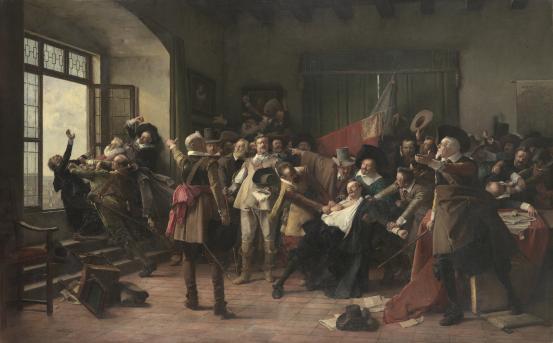Konversationsabend: The Thirty Years’ War (1618-1648) – a War to be remembered
Wed. Oct. 10, 2018 - 6:00pm - 9:00pm
We will meet again on Wednesday, Oct. 10, 6 pm in the Ratskeller at the German Society. You will have easy access – the new steps down to the Ratskeller can now be used, the door will be open.
Our subject for the evening will be “The Thirty Years' War (1618 – 1648) – a War to be remembered.”
For several centuries, this was the war that served as measuring stick for war crimes and brutalities, the devastation of entire regions, civilians and soldiers killed or maimed (6 million war related deaths out of 18 million people in Germany). Then World War II came around and presented a new frame of reference for wartime horror. But in recent years, the Thirty Year War has again raised the interest of historians. Too numerous are the resemblances with the wars that we now see in the Middle East, conflicts that don’t seem to be able to end. Again there is an unholy blending of religious and political interests, personal ambitions of individual leaders, the involvement of regional rulers and war lords, the interference of foreign powers, the loss of central control of the various armies and militias, fighters of all kinds of nationalities with all kinds of motivations. The Thirty Years' War may well be called a failed war. Even the few “winners” lost. However, after years of negotiations, a peace treaty was signed by all major participants, the “Westfaelischer Frieden” of 1648. This treaty put an end to the infamous previous ruling that the religion of the ruler had to be the religion of the people (cuius regio, eius religio) which had led to religious persecution and refugee problems, and finally to war of everybody against everybody. Yet, some historians think that the peace treaty of 1648 might, at least partially, be a model for ending the crisis in the Middle East.
We will look at some war related images, then read the 8th chapter of H.J.C. Grimmelshausen's “Adventurous Simplicissimus Teutsch” (1668) which will make us laugh out loud while suppressing our horror. Having himself been a soldier for many years, Grimmelshausen wrote a grandiose epos of this war (comparable in some ways to “The Tin Drum” by Guenter Grass’), using satire and realistic language, and a sympathetic young rogue or picaro who tumbles from adventure to adventure learning forever better the “art” of survival. Then we will proceed to discussing the war as outlined above.
As always – all are invited, all are welcome. Refreshments will be served.
Our subject for the evening will be “The Thirty Years' War (1618 – 1648) – a War to be remembered.”
For several centuries, this was the war that served as measuring stick for war crimes and brutalities, the devastation of entire regions, civilians and soldiers killed or maimed (6 million war related deaths out of 18 million people in Germany). Then World War II came around and presented a new frame of reference for wartime horror. But in recent years, the Thirty Year War has again raised the interest of historians. Too numerous are the resemblances with the wars that we now see in the Middle East, conflicts that don’t seem to be able to end. Again there is an unholy blending of religious and political interests, personal ambitions of individual leaders, the involvement of regional rulers and war lords, the interference of foreign powers, the loss of central control of the various armies and militias, fighters of all kinds of nationalities with all kinds of motivations. The Thirty Years' War may well be called a failed war. Even the few “winners” lost. However, after years of negotiations, a peace treaty was signed by all major participants, the “Westfaelischer Frieden” of 1648. This treaty put an end to the infamous previous ruling that the religion of the ruler had to be the religion of the people (cuius regio, eius religio) which had led to religious persecution and refugee problems, and finally to war of everybody against everybody. Yet, some historians think that the peace treaty of 1648 might, at least partially, be a model for ending the crisis in the Middle East.
We will look at some war related images, then read the 8th chapter of H.J.C. Grimmelshausen's “Adventurous Simplicissimus Teutsch” (1668) which will make us laugh out loud while suppressing our horror. Having himself been a soldier for many years, Grimmelshausen wrote a grandiose epos of this war (comparable in some ways to “The Tin Drum” by Guenter Grass’), using satire and realistic language, and a sympathetic young rogue or picaro who tumbles from adventure to adventure learning forever better the “art” of survival. Then we will proceed to discussing the war as outlined above.
As always – all are invited, all are welcome. Refreshments will be served.
All of our events are open to the public.
We welcome members and non-members alike.
We welcome members and non-members alike.
